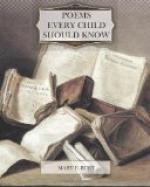CUPID DROWNED.
“Cupid Drowned” (1784-1859), “Cupid
Stung” (1779-1852), and “Cupid and
My Campasbe” (1558-1606) are three dainty
poems recommended by Mrs.
Margaret Mooney, of the Albany Teachers’
College, in her “Foundation
Studies in Literature.” Children
are always delighted with them.
T’other day as I was
twining
Roses, for a crown to dine
in,
What, of all things, ’mid
the heap,
Should I light on, fast asleep,
But the little desperate elf,
The tiny traitor, Love, himself!
By the wings I picked him
up
Like a bee, and in a cup
Of my wine I plunged and sank
him,
Then what d’ye think
I did?—I drank him.
Faith, I thought him dead.
Not he!
There he lives with tenfold
glee;
And now this moment with his
wings
I feel him tickling my heart-strings.
LEIGH HUNT.
CUPID STUNG.
Cupid once upon a bed
Of roses laid his weary head;
Luckless urchin, not to see
Within the leaves a slumbering
bee.
The bee awak’d—with
anger wild
The bee awak’d, and
stung the child.
Loud and piteous are his cries;
To Venus quick he runs, he
flies;
“Oh, Mother! I am wounded
through—
I die with pain—in
sooth I do!
Stung by some little angry
thing,
Some serpent on a tiny wing—
A bee it was—for
once, I know,
I heard a rustic call it so.”
Thus he spoke, and she the
while
Heard him with a soothing
smile;
Then said, “My infant,
if so much
Thou feel the little wild
bee’s touch,
How must the heart, ah, Cupid!
be,
The hapless heart that’s
stung by thee!”
THOMAS MOORE.
CUPID AND MY CAMPASBE.
Cupid and my Campasbe played
At cards for kisses.
Cupid paid.
He stakes his quiver, bow
and arrows,
His mother’s doves and
team of sparrows.
Loses them, too; then down
he throws
The coral of his lips, the
rose
Growing on his cheek, but
none knows how;
With them the crystal of his
brow,
And then the dimple of his
chin.
All these did my Campasbe
win.
At last he set her both his
eyes;
She won and Cupid blind did
rise.
Oh, Love, hath she done this
to thee!
What shall, alas, become of
me!
JOHN LYLY.
A BALLAD FOR A BOY.
Violo Roseboro, one of our good authors, brought
to me “A Ballad for a
Boy,” saying: “I believe it
is one of the poems that every child ought
to know.” It is included in this
compilation out of respect to her
opinion and also because the boys to whom I
have read it said it was
“great,” The lesson in it is certainly
fine. Men who are true men want
to settle their own disputes by a hand-to-hand
fight, but they will
always help each other when a third party or
the elements interfere.
Humanity is greater than human interests.




